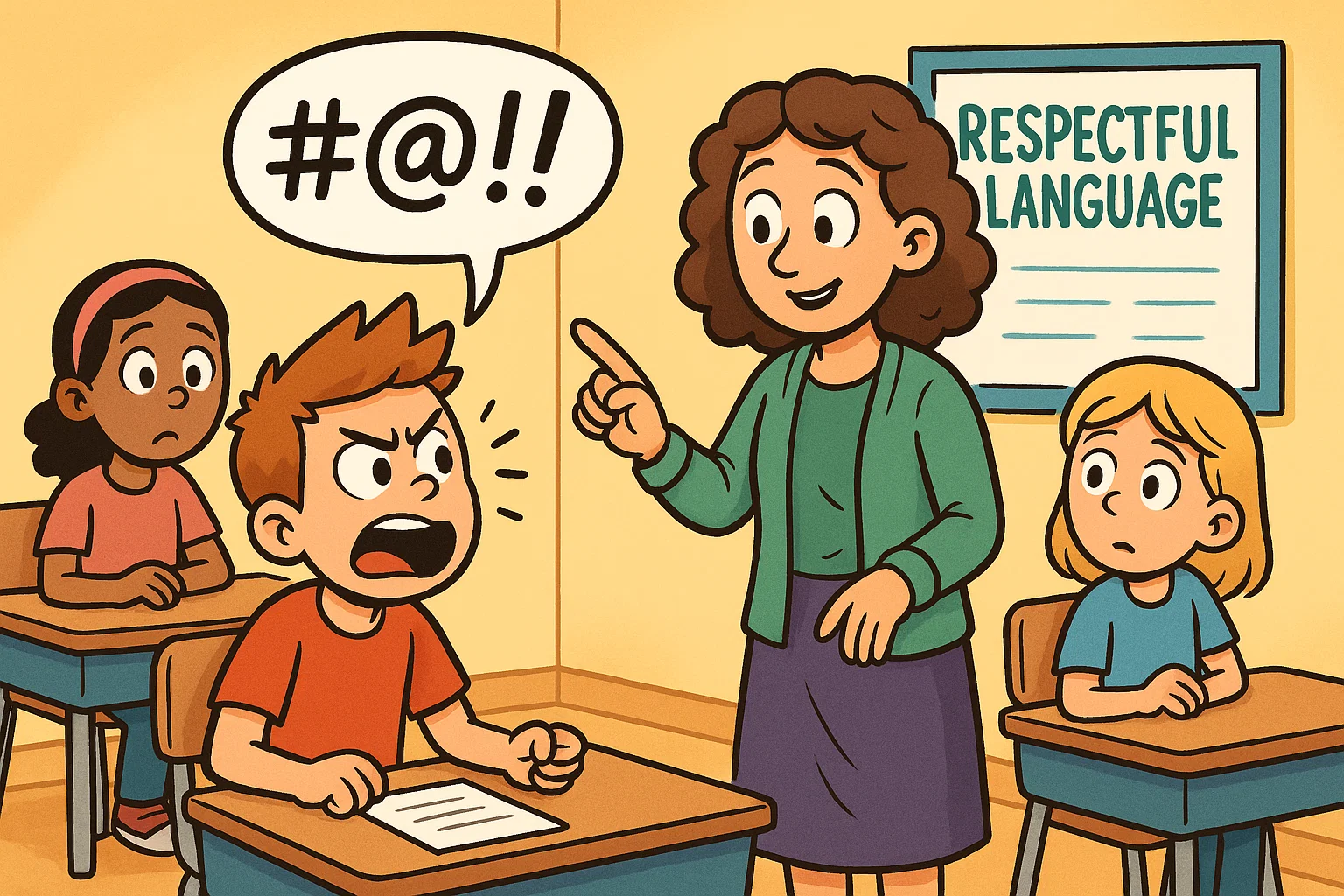Swearing at school remains a common behavioral concern across elementary, middle, and high school settings. While a single instance of inappropriate language may appear minor, repeated use of bad words in school can disrupt classrooms, strain peer relationships, and lead to disciplinary consequences. Understanding why swearing happens in school is essential for choosing effective responses.
This guide examines the causes of swearing in class, explains what happens if a student swears at school, and outlines practical strategies for stopping foul language. Parents and educators will find clear explanations of school rules, behavior management techniques, and age-appropriate interventions designed to promote respectful communication and emotional control.
Why Swearing Happens at School?
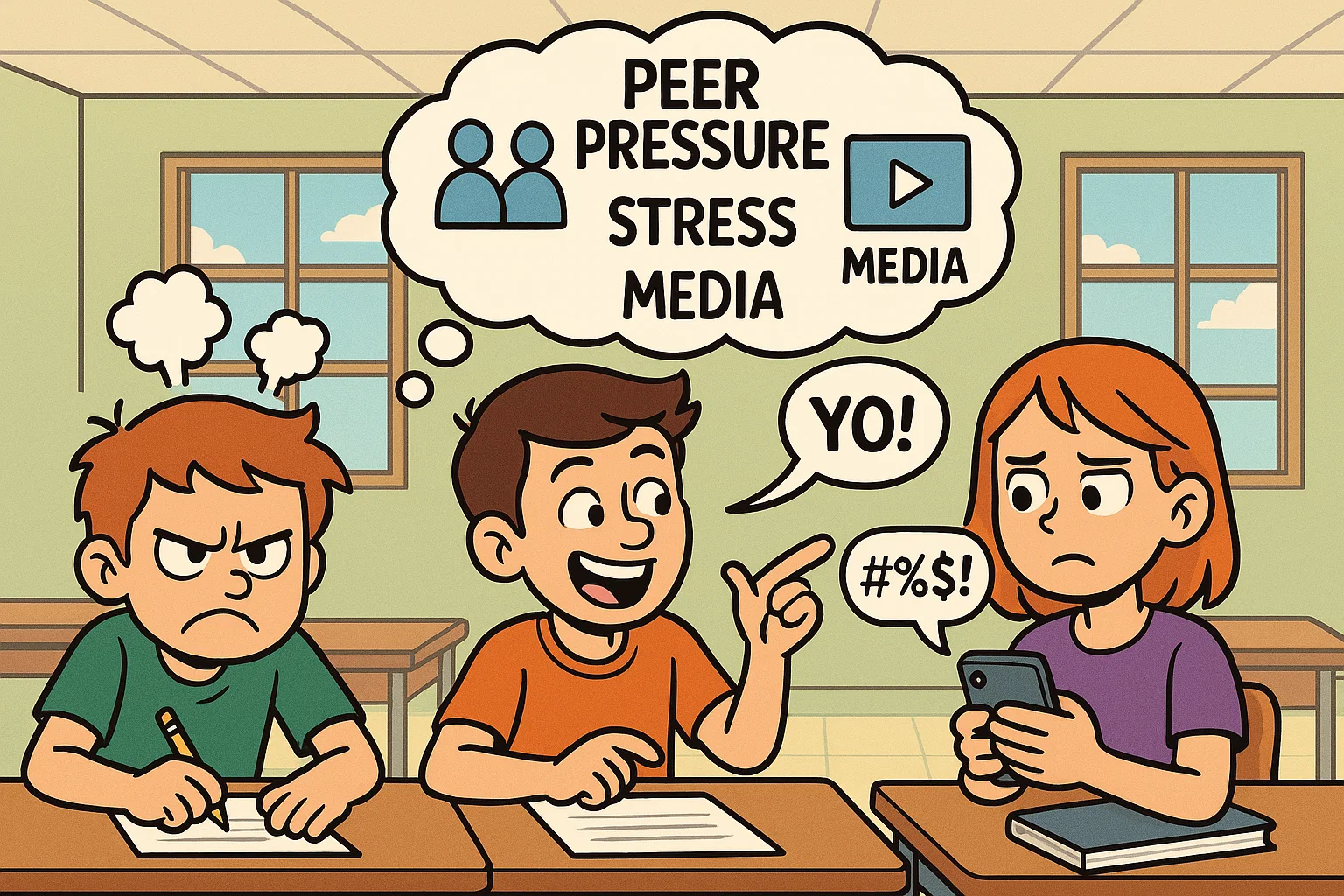
Understanding the root causes of swearing is the first step toward finding a solution. A child may use unacceptable language for a variety of reasons, and the motivation behind it can often tell you how to best respond.
Swearing at Different School Ages: Elementary vs. Middle School
Swearing in elementary school often occurs without full awareness of meaning or consequences. Younger children may repeat bad words they hear at home, in media, or from peers, without understanding why such language is inappropriate in school settings. At this stage, correction focuses on explanation, modeling appropriate speech, and reinforcing classroom rules.
In middle school, swearing behavior tends to change in motivation and intensity. Students become more aware of social norms and may use bad words intentionally to test boundaries, gain peer approval, or assert independence. Questions such as are you allowed to cuss in middle school reflect growing curiosity about limits and consequences. Addressing bad words in high school and middle school requires clearer accountability, consistent enforcement, and discussions about reputation and long-term impact.
Influence of peers and social groups
For many students, especially pre-teens and teenagers, the use of swear words is a way of fitting in. Peer pressure can be a powerful motivator. A student might hear a friend use that word and think, “I want to sound cool like them.” Swearing can be a form of social currency, a way to show allegiance to a particular group or appear more mature and worldly. It’s often about seeking a sense of belonging or gaining a feeling of toughness. When students learn that certain different words are “taboo,” they can also become excited to use them in front of friends, adding a sense of rebellion or “forbidden” fun.
Emotional triggers
Anger or frustration is one of the most common reasons a child uses swear words. When a student is overwhelmed by a strong feeling, like failing a test, losing a game, or getting into an argument, they may curse as an emotional release. Swearing can act as a verbal punching bag, a quick and intense way to vent without physically lashing out. In some cases, it can also be a sign of boredom, with a student using bad language to get a reaction or simply pass the time in class. Research shows that swearing can actually increase pain tolerance and serve as an outlet for frustration. In one study, participants were able to keep their hands in icy water significantly longer when repeating a swear word compared to a neutral word.
Media and environment influence
Children are like sponges, and they learn from what they hear. Language comes from their environment—from what they watch on TV and in movies, the video games they play, and the adults they’re around. If a child hears profane language at home or sees it normalized in media, they may see it as an acceptable form of communication. It’s not always a sign of a bad home life; sometimes a parent might drop a curse in a moment of surprise or stress without thinking twice, and a child is using that exciting word in a different situation at school. This is why it’s important to teach children about context and the difference between public and private behavior.
Effects of Swearing on Students and School Environment
Swearing isn’t a harmless behaviour; it has real, tangible consequences for everyone involved. While one offence may not seem like a big deal, a pattern of foul language can degrade the entire school climate.
Impact on classroom atmosphere
When a student swears in class, it can be a major disruption. It breaks the focus of other students and forces the teacher to stop the lesson to address the issue. Over time, it can erode the feeling of safety and respectful language that schools strive to create. Other students may become uncomfortable, and it can create an atmosphere of disrespect and tension. It’s a chain reaction: one swear word can lead to another, and soon the entire class environment is compromised.
Consequences for student reputation
A student who frequently uses bad language can quickly earn a reputation for being disrespectful or having self-control issues. This can damage their relationships with teachers, who may lose trust in the student’s ability to handle responsibility. It can also hurt peer relationships, as other students may start to avoid them or use name-calling in return. In the long run, this reputation can impact a student’s standing in the school community and even affect their chances of being chosen for leadership roles or extracurricular activities.
School disciplinary measures
Every school has a school policy regarding inappropriate language. When a student can’t stop swearing, they can face a range of disciplinary actions. This could be a verbal warning, detention, a call home to parents, or, for repeated offenses, a suspension. This sanction is not meant to be punitive but to help the student understand the seriousness of their behaviour. For teachers, it’s important to make it clear that such language is a violation of the rules.
| Type of Offense | Typical Disciplinary Action | Goal |
| First offense | Verbal warning, short discussion | Educate and correct behavior |
| Repeated offenses | Detention, loss of privileges, call to parents | Show seriousness, involve family |
| Severe or aggressive swearing | Suspension, meeting with counselor | Address underlying issues, set clear boundaries |
Practical Strategies to Stop Swearing
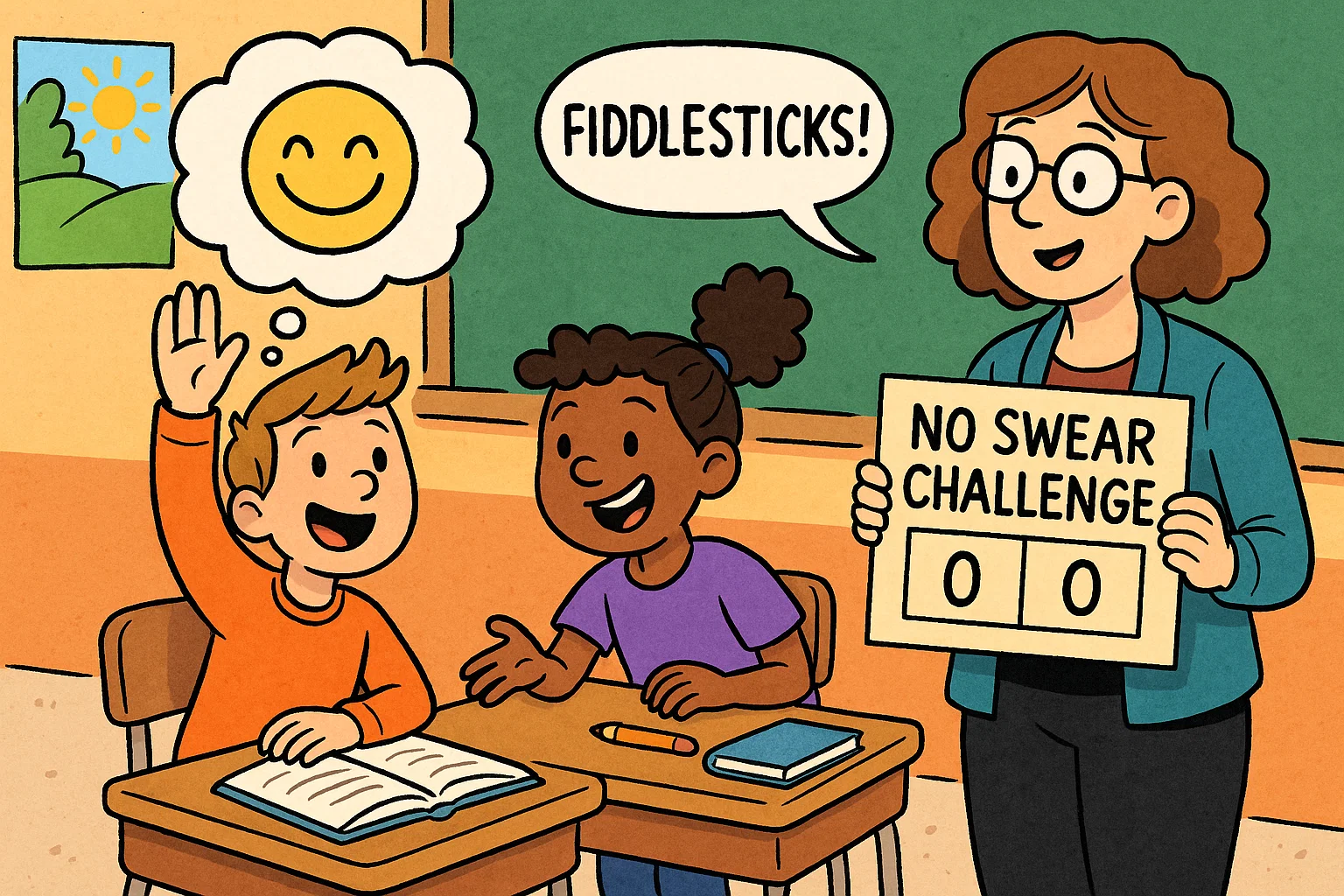
The good news is that there are many effective ways to address and correct the behaviour of swearing. By working together, students, teachers, and parents can create a positive change.
Self-control techniques for students
Children need to be taught emotional regulation skills. When a child is using foul language out of anger or frustration, they can be taught alternative responses. Encourage them to:
- Count to ten: This simple act provides a moment of pause, allowing the rational part of the brain to catch up with the emotional part.
- Take a few deep breaths: Deep breathing can lower the heart rate and calm the nervous system, helping to stay calm and defuse the situation.
- Walk away: If a conversation is getting heated, walking away can prevent an angry outburst. A student can say, “I need a minute,” and then leave the situation until they feel calmly ready to discuss it.
Alternatives to swear words
This can be a fun and effective way to discourage swearing. Brainstorm with your child to come up with creative, silly, or less offensive substitute words. For example, instead of a common swear word, they could use “fiddlesticks,” “poop,” or “oh, shucks.” This approach gives a student an alternative without taking away the emotional release. It helps them recognize that the impulse to say something intense is normal, but the words they use can be changed.
Teacher and parent involvement
Consistency is key. Teachers and parents must be on the same page. When a child swears, everyone should have a similar, consistent response. Parents should support the school’s rules, and teachers should understand that some of the language comes from the student’s home or social life. A unified front sends a clear message that this behavior is unacceptable, no matter the setting.
Reward systems and positive reinforcement
Positive reinforcement can be much more powerful than punishment. A child may be more motivated by praise and rewards than by the fear of punishment. For example:
- “No-swear” challenges: A class can work toward a collective goal, like a pizza party, by not using bad language for a week.
- Praise: When a child successfully uses an alternative to cussing, offer specific and sincere praise. “I love how you took a deep breath instead of saying that word. That shows great self-control.”
- Class points: Teachers can give out points for respectful language and positive interactions, leading to a reward for the whole group.
How to Stop Swearing When Angry
Swearing often increases during moments of anger or frustration, especially when emotional regulation skills are underdeveloped. Teaching how to stop swearing when angry begins with helping students recognize physical and emotional warning signs, such as increased heart rate or impulsive reactions.
Negative reinforcement can support behavior change when applied correctly. For example, calmly removing a privilege after repeated swearing reinforces the connection between language and consequences without escalating conflict. Combined with coping strategies such as deep breathing, taking a break, or using replacement phrases, this approach reduces emotional outbursts and improves long-term self-control.
Role of Teachers in Managing Swearing at School
Teachers are on the front lines of this issue. Their response can either escalate the problem or defuse it.
Setting clear rules and expectations
At the beginning of the school year, teachers should dedicate time to discuss the issue of inappropriate language as part of the classroom rules. Students learn better when they understand the “why.” Explain that respectful language is a sign of maturity and that it helps create a safe and positive learning environment for everyone. This way, the school policy isn’t just a list of rules but a shared agreement.
Modeling respectful language
Teachers are powerful role models. By using respectful language themselves, even in moments of stress, they provide a strong example. Avoid using slang or casual profanity, even if it’s common. When a teacher uses that word themselves, it makes it much harder to teach your child that it’s wrong. A student may think, “Why is it okay for the teacher but not for me?”
Calm responses to swearing
An over-the-top reaction to a swear word can give it the shock value a student is looking for. The best strategy is to address it calmly, without making a big scene. Instead of shouting, a teacher might simply say, “That’s unacceptable language in this classroom. We’ll talk about this later.” This addresses the behaviour but doesn’t disrupt the entire lesson. By addressing it later in private, the teacher can have a more meaningful conversation with the student.
Using role play and social stories
For younger students, role-playing scenarios can be very effective. A teacher can create a social story about a student who gets angry and wants to cuss, then role-play how that student could use an alternative to swearing. This helps children learn in a visual and interactive way.
Support from Parents at Home
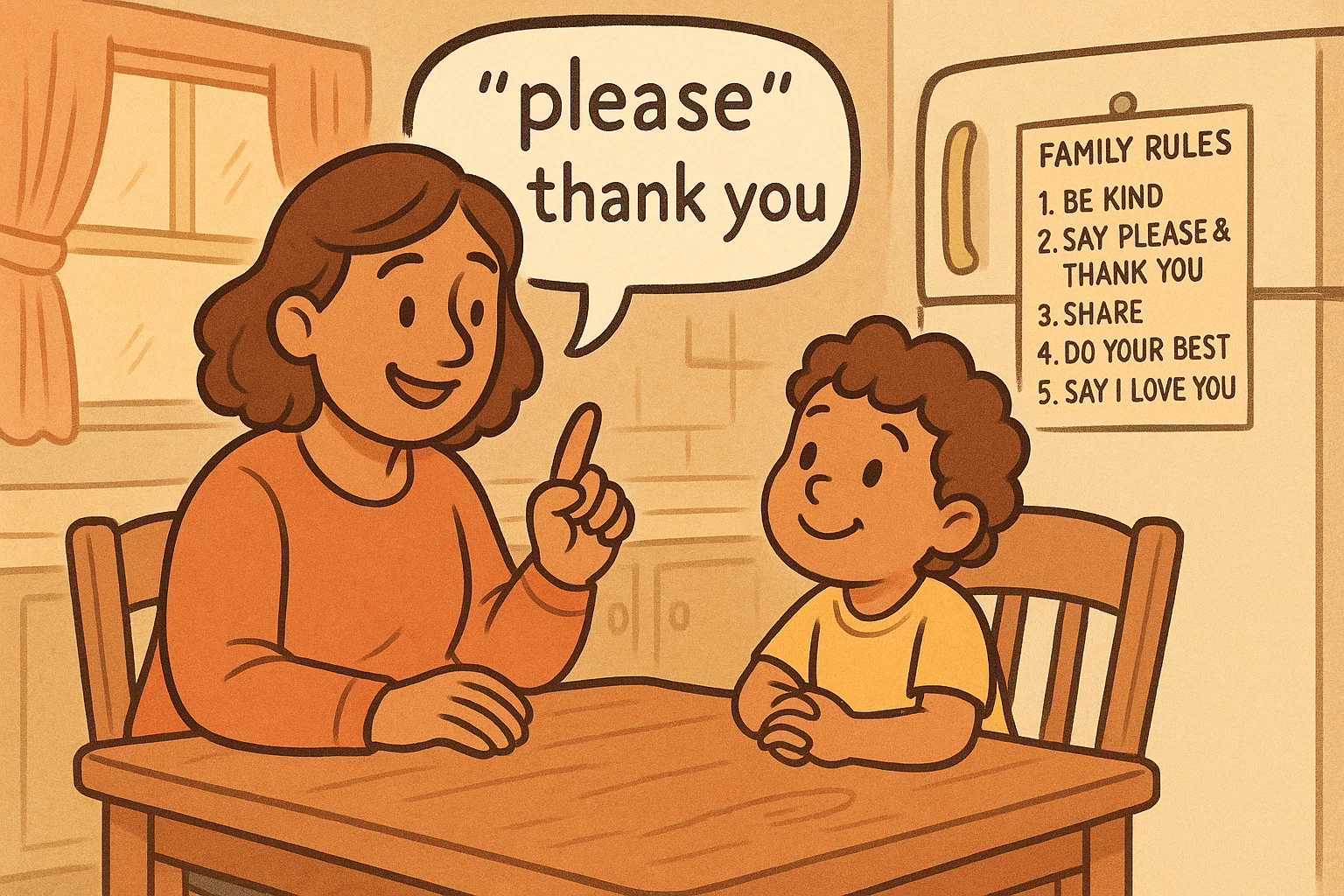
Parents are the most important partners in this process. What happens at home has a huge influence on a student’s behaviour at school.
Talking about word meaning and respect
It’s not enough to just say, “Don’t swear.” You need to help your child understand why. Discuss the issue by explaining that certain words are considered hurtful or offensive because of their historical context or the negative feelings they evoke. Help your child understand that using profane words can make others feel disrespected. For example, explain that some words have been used to oppress certain groups of people, and by using them, they’re perpetuating that hurt.
Consistent family rules
If the school has a school policy against bad language, the home should too. There should be no double standards between home and school. If a child hears their parents curse, but then they’re punished for it at school, it can create confusion and resentment. The rules should be the same everywhere.
Alternative outlets for emotions
As a parent, you need to help your child find healthy ways to express anger or frustration. Encourage hobbies like playing sports, creating art, journaling, or learning a musical instrument. These activities provide a positive outlet for intense emotions, reducing the need to resort to cussing or other negative behaviours.
Helping Teens with Swearing Habits
The best strategies for younger kids might not work for a teenager. With teens, the issue is often more complex, involving defiance and a desire to push boundaries.
Recognizing defiance and boundary-pushing
For a teen, using foul language might be a way of testing authority. It’s their way of saying, “You can’t control me.” In this case, your response should be firm but not overly emotional. Avoid yelling, as this can give them the reaction they are looking for. Instead, calmly state the consequence of their actions and follow through.
Encouraging responsibility
Help your teen understand that they are responsible for their words and actions. Have a conversation about the kind of person they want to be. Do they want to be known as someone who uses unacceptable language, or someone who is respected and mature? Teach your child to think about the consequences of their choices.
Privileges and consequences
For a teen, the most effective consequences often involve privileges like their phone, gaming time, or social outings. If they can’t stop swearing, temporarily removing privileges such as phone use can be a powerful motivator. This sends a clear message that their actions have real-world consequences.
Resources and Activities to Reduce Swearing
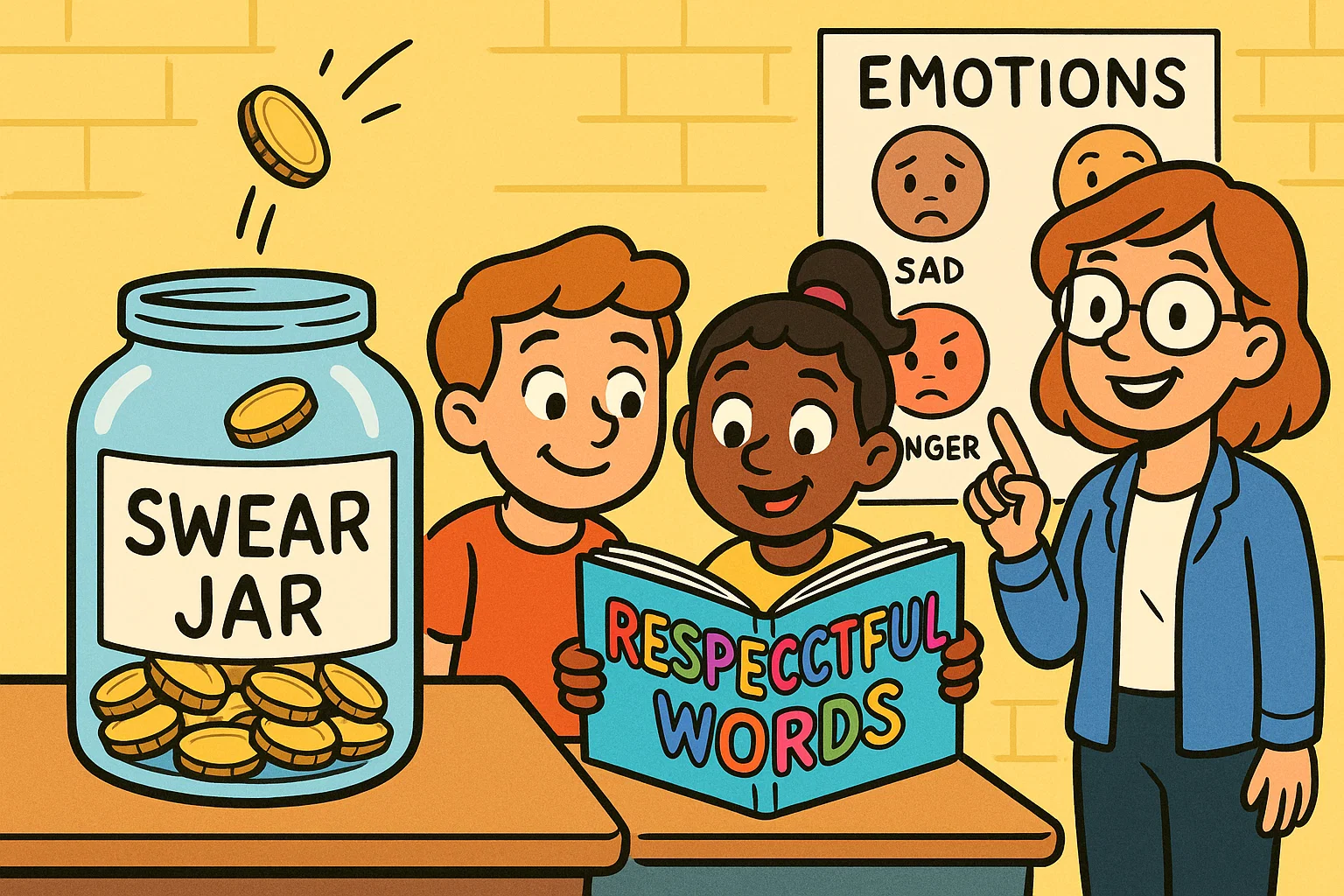
Cuss jar or swear jar idea
The swear jar is a classic for a reason. Every time a family member swears, they have to put a certain amount of money in the jar. This provides visual accountability and makes the behaviour a collective effort. The money can then be donated to a charity or used for a fun family activity.
Books and classroom activities
There are many books for children that focus on anger management, respectful language, and the power of words. Reading these books and having open discussions about them can be a great way to reinforce positive behaviours.
Counseling and SEL programs
For students who are struggling with a persistent swearing problem, a school counselor can be a valuable resource. Social-Emotional Learning (SEL) programs in schools teach kids to identify their emotions and express them in a healthy way.
Final Tips on Stopping Swearing at School
Remember, consistency is key. Whether you’re a parent, a teacher, or a student, the most important thing is to be persistent and to approach the issue with respect. Focus on positive reinforcement and teach your child the importance of communication. It’s about helping them find their voice and express themselves in a way that shows respect for themselves and others.


